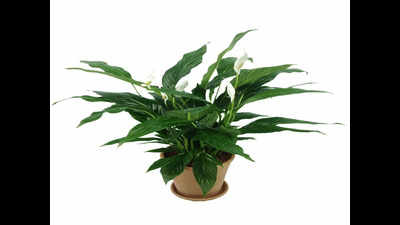- News
- City News
- delhi News
- This Diwali, Delhiites are gifting green: Plants that filter bad air
Trending
This story is from November 4, 2018
This Diwali, Delhiites are gifting green: Plants that filter bad air

Air purifying plants
NEW DELHI: Air purifying plants are in big demand these days. Nurseries in Delhi say their sales have nearly doubled in the past few weeks because people want to do everything possible to reduce pollution.
Some of them are also buying them to gift to others on Diwali, says Padamchand Saini, owner of Joginder nursery in Bakhtawarpur in northwest Delhi.
“We have a separate section for air purifying plants.It includes areca palm, bamboo palm and Sansevieria,” he said.
These plants cost anywhere between Rs 150 to Rs 500 or more depending on their size and quality, said Vikram saini, owner of Masjid nursery, Khan market. Many online sites also have separate section for air purifying plants.
There are a few studies to show the science behind the belief that plants help curb pollution. One of them, which proponents the theory and horticulturalists refer to, is done by the National Aeronautics and Space Administration (NASA). It states: “Low-light requiring houseplants, along with activated carbon plant filters, have demonstrated the potential for improving indoor air quality by removing trace organic pollutants from the air in energy efficient building.”
Dr Sandeep Salvi, director of the Pune-based Chest Research Foundation, says the theory has also been proved through exposure experiments. The microbes in soil and leaves absorb volatile chemicals, thus reducing pollution, says Salvi.
According to Dr K K Aggarwal, indoor air pollution is the second largest killer causing about 1.3 million deaths in India each year.
“Poor ventilation and structural designs can trap volatile organic compounds, bioaerosols, and particulate matter leading to many health ailments including impairment of lung function,” the former president of Indian Medical Association said.
He added plants are a source of fresh air and adding them is certainly beneficial. Air purifiers are also quite popular and their sales have gone up but there isn’t enough data to prove its worth as yet. “Something is better than nothing. I cannot live under the fear the breathing toxic air. This machine at least gives me that sense of relief,” said Neeta Sen, who recently purchased a wearable air purifier.
Some of them are also buying them to gift to others on Diwali, says Padamchand Saini, owner of Joginder nursery in Bakhtawarpur in northwest Delhi.
“We have a separate section for air purifying plants.It includes areca palm, bamboo palm and Sansevieria,” he said.
These plants cost anywhere between Rs 150 to Rs 500 or more depending on their size and quality, said Vikram saini, owner of Masjid nursery, Khan market. Many online sites also have separate section for air purifying plants.
“We cannot change the city. Going away for a few days is not a practical solution for everyone either. So, I have decided to do my bit for my children’s health by planting these at home,” said Mihir Kumar, a resident of Sarita Vihar, who was seen buying over a dozen such plants from one of the nurseries on Saturday. “Some of them are Diwali gifts,” he added. Sansevieria, also referred to as mother-in-law’s tongue plant perhaps because of its sharp leaves, is the most popular.
There are a few studies to show the science behind the belief that plants help curb pollution. One of them, which proponents the theory and horticulturalists refer to, is done by the National Aeronautics and Space Administration (NASA). It states: “Low-light requiring houseplants, along with activated carbon plant filters, have demonstrated the potential for improving indoor air quality by removing trace organic pollutants from the air in energy efficient building.”
Dr Sandeep Salvi, director of the Pune-based Chest Research Foundation, says the theory has also been proved through exposure experiments. The microbes in soil and leaves absorb volatile chemicals, thus reducing pollution, says Salvi.
According to Dr K K Aggarwal, indoor air pollution is the second largest killer causing about 1.3 million deaths in India each year.
“Poor ventilation and structural designs can trap volatile organic compounds, bioaerosols, and particulate matter leading to many health ailments including impairment of lung function,” the former president of Indian Medical Association said.
He added plants are a source of fresh air and adding them is certainly beneficial. Air purifiers are also quite popular and their sales have gone up but there isn’t enough data to prove its worth as yet. “Something is better than nothing. I cannot live under the fear the breathing toxic air. This machine at least gives me that sense of relief,” said Neeta Sen, who recently purchased a wearable air purifier.
End of Article
FOLLOW US ON SOCIAL MEDIA










